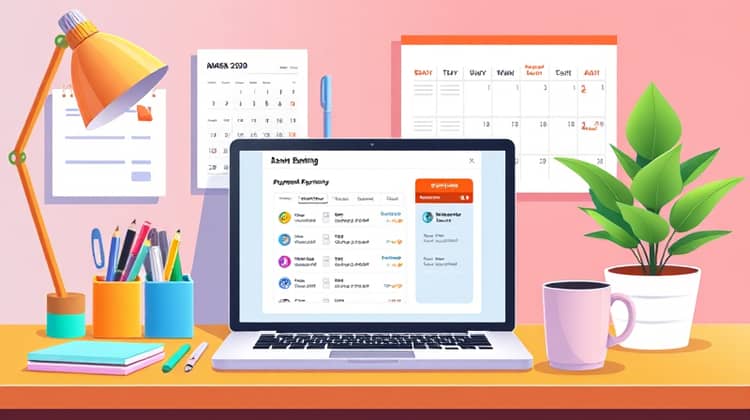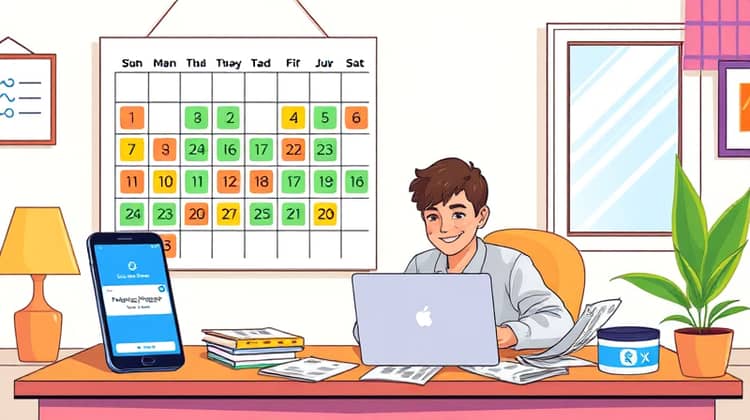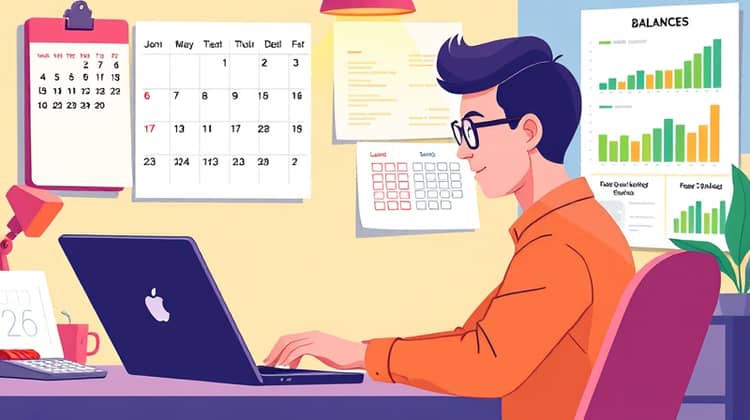Managing personal loan payments can often feel overwhelming, but with the right strategies, it can become a more manageable task. Personal loans, while helpful in times of need, can also generate stress and unexpected financial strain if not handled properly. Here are eight essential tips to help you manage your personal loan payments effectively and maintain financial stability.
By establishing a solid approach toward your loans, you can avoid pitfalls like late fees and debt accumulation, giving you peace of mind and confidence in your financial future. Whether it’s creating a budget, setting up automatic payments, or seeking professional advice, these strategies can significantly boost your ability to manage loans sustainably.
Let's delve into these tips, starting with the significance of having a realistic budget tailor-made for your personal financial situation.
1. Create a Realistic Budget

Creating a realistic budget is foundational for managing your personal loan payments. A budget allows you to understand your income, expenses, and how much you can allocate toward loan repayments without jeopardizing your financial stability. Having a clear picture of your finances is the first step in effective loan management.
When building your budget, be honest with yourself about your spending habits. Identify necessary expenses for living and ensure you allocate funds for savings and unforeseen expenses before designating what remains for loan payments.
- Track all your income sources: Salary, side jobs, etc.
- List all your monthly expenses: Rent, utilities, groceries, etc.
- Determine your disposable income after accounting for all expenses.
- Allocate a portion of your disposable income specifically for loan repayments.
Regularly revisiting and adjusting your budget is essential as your financial circumstances may change. Consider tracking your spending habits using apps or spreadsheets to better understand where money tends to go, making it easier to identify areas to cut back on when needed.
Over time, a well-structured budget can help you stay ahead of your loan payments, improve your financial literacy, and create pathways for savings, allowing you to build a healthier financial future.
2. Set Up Automatic Payments

Setting up automatic payments is a smart way to ensure you never miss a loan payment. By linking your loan payments to your bank account, you can automate the process, helping you stay organized and punctual with payments, which ultimately can improve your credit score.
Additionally, this method can help you avoid the hassle of tracking due dates for each loan, giving you one less thing to worry about in your busy life.
- Select a reliable bank for automatic transactions.
- Choose the payment date: ideally when your salary is deposited.
- Verify that you have sufficient funds to cover the payment each month.
- Monitor your account to ensure successful transactions.
However, it’s important to regularly review your automatic payment settings to ensure that they align with your finances. If your income changes or you have to make significant expenses, you may want to adjust the amount or frequency of your payments accordingly.
Staying in control of your automatic payments today can prevent larger issues, such as late fees or negative credit impacts, down the line.
3. Prioritize High-Interest Loans

Not all loans are created equal, especially when it comes to interest rates. It's essential to identify which loans have the highest interest rates and prioritize paying those down first. This practice will minimize the amount of money lost to interest charges over time, potentially saving you a lot in the long run.
By focusing on high-interest loans, you can reduce your overall debt burden more quickly, which leads to greater financial freedom in the future.
- Identify loans with the highest interest rates.
- Increase payments on high-interest loans while making minimum payments on others.
- Consider consolidating high-interest loans into a lower-interest option if possible.
- Track your repayment progress regularly.
It's also beneficial to balance prioritization with maintaining consistent payments on lower-interest loans. This way, you can manage multiple payments without falling behind while still making significant progress on higher-interest debts.
Furthermore, consider double-checking your interest rates against other offerings in the market. If your loan terms seem outdated or excessively high, it might be time to think about refinance options to secure better rates.
4. Explore Refinancing Options

Refinancing is another powerful tool in loan management. If your financial situation or credit score has improved since you took out your loan, you may be eligible for better interest rates or terms that could lower your monthly payment and save you money.
This option can be especially appealing for high-interest loans, as lowering your interest rate directly reduces the overall cost of borrowing.
- Research potential lenders that offer refinancing services.
- Calculate the potential savings from refinancing your loans.
- Understand any fees associated with the refinancing process.
- Consider the length of the new loan terms before making a decision.
While refinancing can offer substantial advantages, ensure that you understand the implications of extending your loan term, as this can sometimes lead to paying more interest over time if not carefully assessed.
Take the time to consult with financial advisors or loan representatives about your options to find the best refinancing solutions that suit your needs.
5. Avoid Late Fees

Late fees can quickly pile up and create additional financial stress. One of the simplest ways to avoid these fees is to consistently make payments on or before their due dates. Even a single missed or late payment can negatively impact your credit score, so preemptive measures are vital.
Utilizing a calendar or reminders can help you track when payments are due and when you need to make them.
- Set alerts for payment due dates on your phone.
- Use a wall calendar to mark due dates for additional visibility.
- Consider consolidating payments to avoid multiple due dates in a month.
If possible, pay your loans early or if you can make additional lump sum payments during earlier months, doing so can be incredibly beneficial. This sometimes comes without additional fees, accelerating your pathway to debt freedom.
Consistently being proactive about your payment schedule tends to foster a healthy financial habit, which in turn mitigates potential stressors like late fees.
6. Monitor Your Loan Balances

Keeping an eye on your loan balances is crucial to understanding your debt situation. Regularly checking your loan balances not only updates you on how much you owe but also allows you to strategize future payments effectively.
By being aware of your loan amounts, you can better manage your budget and adjust your other financial commitments accordingly.
- Check your loan balance monthly.
- Utilize online banking tools to stay updated.
- Document your repayment progress systematically.
- Compare the outstanding balance against your budget regularly.
Staying informed about your balances makes it easier to notice any discrepancies or errors, which is critical to ensuring you’re not paying more than necessary.
By closely monitoring what you owe, you also become more aware of your repayment capabilities, helping to adjust your financial planning accordingly.
7. Don’t Rely on Credit Cards

While credit cards can be convenient financial tools, relying on them to manage your personal loan payments can be a slippery slope. Using credit cards to pay off existing loans can lead to increased debt and financial burden if not handled carefully.
Establishing a mindset of self-sufficiency when it comes to managing loans is vital for avoiding this trap.
- Allocate different accounts for loans and credit cards.
- Limit credit card usage to necessary expenses only.
- Pay off credit card balances each month to avoid revolving debt.
- Consider placing a pause on credit account applications while managing current debts.
If you find yourself accumulating credit card debt while trying to pay personal loans, it may be time to reevaluate your financial strategy. Consider consolidating debts or seeking outside assistance if it becomes too cumbersome.
Maintaining a healthy distance from credit card debts can ultimately help keep your financial palette clean and easier to manage.
8. Seek Professional Advice

If you find managing your personal loan payments overwhelming, don't hesitate to seek professional help. Financial consultants and advisors can provide insights tailored to your specific financial situation and can guide you on managing debt more effectively.
Professional advice can be immensely valuable in informing ideal strategies for budgeting, loan prioritization, and options for refinancing.
- Research qualified financial advisors in your area.
- Prepare your financial documents beforehand for consultation.
- Ask for recommendations from trusted sources.
- Evaluate potential advisors' fees to prevent additional strains.
Professional guidance often comes with a wealth of knowledge acquired from years of experience in the financial sector. They can help you navigate complexities and create solid plans for debt management.
Navigating personal loans can be challenging, but with the right support and strategies, achieving financial stability is within reach.
Conclusion

Managing personal loan payments does not have to be an arduous task. By implementing these eight strategic tips outlined above, you can take control of your finances and steer your way towards a debt-free future.
Remember that each individual's financial circumstances are unique, and it is important to tailor these strategies to fit your situation. Whether through creating a budget, seeking professional advice, or continuously monitoring your balances, you can develop a plan that works for you.
In conclusion, flexibility, accountability, and proactivity are key elements in managing personal loans effectively.














